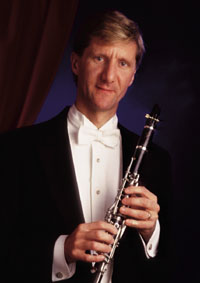Sometimes your heart is into it, and other times, well, you just go through the motions. We had a tough week for the orchestra last week. Our ex-Music Director was engaged for a guest appearance. A few years ago the orchestra and board were deeply divided over whether to keep him on as music director. Ultimately, one faction won and he was ďallowed to move onĒ in his career.
So when he came back last week, only a week after being conducted by our new music director, whom we LOVE, it was an uphill struggle to keep up our spirits. The program consisted of the Tchaikovsky Piano Concerto and Brahms 3rd Symphony. Brahms 3rd is one of my favorites, not only because it has a gorgeous clarinet solo in the second movement, but itís also a masterpiece of symphonic composing. Picture it. Our ex-Director, who always explores the limits of every phrase, is leading us through this incredible piece, and half of us are suffering through it while the other half are trying to get into it.
To credit the orchestra, everyone did their best to do make music. This guy, despite his passion, is known for his unpredictable interpretations. And thatís putting it lightly. To him, all music is Italian opera, full of drama. He can swoop down on phrase from the middle of nowhere and wallow in it like a girl in a bubble bath. Meanwhile, weíre turning blue or purple, his least favorite color, waiting for the next beat. And sometimes the next beat is really a beast, which swallows the bubble bath whole, girl and all, moving ahead to the prowl on the next unsuspecting phrase.
Now donít get me wrong or anythingÖI like him. Heís a great cook and in love with life, something most Americans know little about. We are a culture of bean counters, note takers, fact checkers, time keepers, rule makers, and on. Making music is not about those things. Itís about being free of the structures which convey its language. Itís about letting time float. Occasionally, he creates a brilliant nuance I could never imagine, which shudders through me like a homogenization beam from another planet, and I realize what music is all about.
Each musician eventually finds a personal balance between subjective and objective interpretations of music. Subjective interpreters seeks the meaning through the emotions, the feeling of the music, while objective ones strive to recreate the composerís intentions. Both are valid. In my opinion, George Szell maintained the perfect balance between the two.
I lean toward the subjective camp. There are times when I feel Iím only playing the music, not feeling it, not really making music of it. Freshness helps wake me from the blindness of familiarity, especially with pieces Iíve played many times. This weekís Brahms 3rd gave me a chance to see it new, as through a microscope.
Over the years of being under this guy as music director, he has shown me the wonderful nuances and magic which can be pulled from an ordinary phrase of music. Really there are infinite ways to play any piece. The objective camp believes there is one ideal way. I think there are numerous ideal ways. And often you donít know what might work until you try it. Inspiration is critical to making music.
After the show I argued with some colleagues, many of them string players, about these issues. I have to concede, this guy stretched Brahms way beyond the traditional, North German, stoic interpretation which works best with his music: the latent passion struggling to be free of its shadows, the yearning Bohemian dreaming of a better world.
Yet, from my little island of music making within the group, I relished wallowing in the secret depths of Brahmsí introverted complexities, in the rich density of his tonal language, the Escheresque rhythmic structures. And many of my colleagues in the winds and brass felt similarly. We were ďgellinĒ!
The strings, however, saw it completely differently. They are the sea sprawled around our little windy islands. Spread apart and in much greater numbers, they couldnít rely on the intimate person to person connections to stay together like the winds and brass did. They were lost at sea, while the guy up front was busy getting signals from outer space. They were not happy. Nope. Not!
This brings me back to making music versus playing. The two are codependent. This week, while some of us were able to make beautiful music within the relative chaos coming from the podium, to flourish within itís spontaneous freedom and compulsive freshness, others struggled just to play the notes together. Ultimately, if we canít all enjoy the same spontaneity and freedom while playing together, it lacks the most important feature of a great performance: cohesiveness.
So, hereís to guzzling music raw when ever we can, whether itís 24 or 100 proof. But the lasting impression comes in the richness of a balanced meal accompanied by an aged wine, when we can actually remember what we did the night before.




